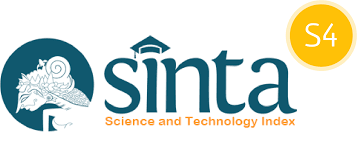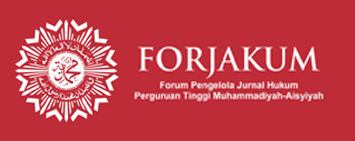PANDANGAN HAKIM PENGADILAN AGAMA BANGKALAN TERHADAP EFEKTIVITAS DAN SANKSI KODE ETIK HAKIM OLEH ORGANISASI PROFESI
DOI:
https://doi.org/10.18196/mls.v1i4.9040Keywords:
Kata Kunci, Hakim, Kode Etik, Efektivitas, Sanksi.Abstract
ABSTRAK
Hakim merupakan salah satu penegak hukum yang menurut Undang-Undang bertugas mengadili perkara di Pengadilan. Dalam Menjalankan Profesinya harus sesuai dengan aturan yang disebut juga dengan Kode Etik Hakim. Adanya ketentuan Kode Etik dan Pedoman Perilaku Hakim diatur dalam Surat Keputusan Bersama (SKB) Nomor 047/KMA/SKB/IV/2009 dan Nomor 02/SKB/P.KY/IV/2009 tentang Kode Etik dan Pedoman Perilaku Hakim yang menerangkan mengenai Kode etik yang harus di patuhi oleh hakim dan harus ada keefektifan dalam menajalankan profesinya. Walaupun terdapat kode etik, tidak menutut kemungkinan bahwa ada hakim yang nantinya lalai yang kemudian melanggar kode etik profesi hakim itu sendiri. Dalam penerapan sanksinya pun harus sepadan dan sesuai dengan pelanggaran yang dilakukan. Artikel ilmiah ini menggunakan metode penelitian ini, penulis menggunakan pendekatan hukum normatif atau penelitian kepustakaan. Sedangkan metode pengumpulan data dalam penulisan artikel ilmiah ini dengan melakukan wawancara terhadap pihak yang terkait.
Kode etik tersebut menjadi suatu keefektifan tersendiri bagi hakim khususnya di Pengadilan Agama Bangkalan dalam menjalankan profesinya, dilihat dari hakim yang memang melaksanakan tugas dan wewenang sesuai dengan Kode Etik Profesi Hakim. Namun. apabila melanggar terdapat sanksi yang diberikan walaupun hakim juga termasuk salah satu penegak umum dilingkup Mahkamah Agung, sanksi yang diberikan berbeda-beda yakni sanksi ringan, sanksi sedang dan sanksi berat. Hal ini disesuaikan dengan ringan beratnya pelanggaran yang dilakukan oleh hakim. Tidak ada sanksi pelaporan pelanggaran yang diajukan masyarakat Bangkalan ke Pengadilan Agama Bangkalan, hal ini membuktikan hakim dilingkup Pengadilan Agama Bangkalan mematuhi kode etik yang berlaku. Sehingga dapat disimpulkan bahwa Pengadilan Agama Bangkalan keefektifan dalam mengimplementasikan adanya Kode Etik Profesi sesuai dengan Pedoman memang benar-benar dipatuhi serta tidak ada sanksi pula yang dilanggar oleh Hakim yang ada di Pengadilan Agama Bangkalan.
Kata Kunci : Hakim, Kode Etik, Efektivitas, Sanksi.
ABSTRACT
The judge is one of the law enforcers who according to the Law is tasked with hearing cases in the Court. In carrying out his profession must be in accordance with the rules, also called the Judges' Code of Ethics. The provisions of the Code of Ethics and the Code of Conduct for Judges are regulated in the Joint Decree (SKB) Number 047 / KMA / SKB / IV / 2009 and Number 02 / SKB / P.KY / IV / 2009 concerning the Code of Ethics and the Code of Conduct for Judges which explains the Code ethics that must be obeyed by the judge and there must be effectiveness in managing his profession. Even though there is a code of ethics, it does not undermine the possibility that there will be judges who will be negligent who then violate the professional code of justice itself. In applying the sanctions must be commensurate and in accordance with the violations committed. This scientific article uses this research method, the author uses a normative legal approach or library research. While the method of collecting data in writing scientific articles is by conducting interviews with related parties.
The code of ethics has become a special effectiveness for judges, especially in the Bangkalan Religious Court in carrying out their profession, seen from judges who indeed carry out their duties and authority in accordance with the Professional Code of Ethics for Judges. However. if there is a sanction violated, even though the judge is also included as one of the general enforcers in the scope of the Supreme Court, the sanctions are different, namely mild sanctions, medium sanctions and severe sanctions. This is adjusted to the severity of the violations committed by the judge. There are no sanctions for reporting violations submitted by Bangkalan people to the Bangkalan Religious Court, this proves that judges in Bangkalan Religious Courts comply with the applicable code of ethics. So it can be concluded that the Bangkalan Religious Court's effectiveness in implementing the existence of the Professional Ethics Code in accordance with the Guidelines was really obeyed and there were no sanctions that were violated by Judges in the Bangkalan Religious Court.
Keywords: Judge, Code of Ethics, Effectiveness, Sanctions.
References
Imron, “Pelanggaran Kode Etik dan Pedoman Perilaku Hakim”, Jurnal Yudisial Vol 12 No.1, April 2019.
Hasil wawancara Hakim Bapak Eko Prastiyo, S.H
Hasil Wawancara Hakim Bapak Zainuri Jali, S. Ag, M.H.
https://www.cnnindonesia.com/nasional/20170726201411-12-230577/langgar-kode-etik-puluhan-hakim-terancam-dijatuhi-sanksi, diakses 26 Juli 2017.
https://beritagar.id/artikel/berita/beragam-pelanggaran-kode-etik-hakim-selama-2018, diakses tanggal 01 Januari 2019.
https://www.komisiyudisial.go.id/frontend, diakses pada tanggl 21 Maret 2020.
Merdekawaty Maesya Putri, “Pertanggungjawaban Hakim Pelaku Pelanggaran Kode Etik Berpotensi Pidana”, Jurnal Hukum, 2016.
Rohim Faqih, Ainur, “Kode Etik dan Pedomn Perilaku Hakim”, Jurnal Agama dan Hak Asasi Manusia Vol 3 No. 1 Januari – April 2013.
Surat Keputusan Bersama (SKB) Nomor 047/KMA/SKB/IV/2009 dan Nomor 02/SKB/P.KY/IV/2009 tentang Kode Etik dan Pedoman Perilaku Hakim
Undang-undang Dasar 1945
Undang-Undang Nomor 48 Tahun 2009
Downloads
Additional Files
Published
Issue
Section
License
Copyright
Authors who publish papers in this journal agree to the following terms:
Authors retain copyright. Authors are permitted to copy and redistribute the journal's published version of the work non-commercially (e.g., post it to an institutional repository or publish it in a book)
Authors are permitted and encouraged to post their work online (e.g., in institutional repositories or on their website) prior to and during the submission process, as it can lead to productive exchanges, as well as earlier and greater citation of published work (See The Effect of Open Access).
This journal is using Attribution-NonCommercial-ShareAlike 4.0 International. You are free to:
- Share — copy and redistribute the material in any medium or format
- Adapt — remix, transform, and build upon the material
The licensor cannot revoke these freedoms as long as you follow the license terms, which include the following:
- Attribution — You must give appropriate credit, provide a link to the license, and indicate if changes were made. You may do so in any reasonable manner, but not in any way that suggests the licensor endorses you or your use.
- NonCommercial — You may not use the material for commercial purposes.
- ShareAlike — If you remix, transform, or build upon the material, you must distribute your contributions under the same license as the original.
- No additional restrictions — You may not apply legal terms or technological measures that legally restrict others from doing anything the license permits.
Creative Commons Attribution-NonCommercial-ShareAlike (CC BY-NC-SA)

This work is licensed under a Creative Commons Attribution-NonCommercial-ShareAlike 4.0 International License.



